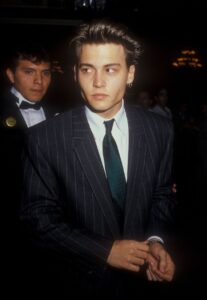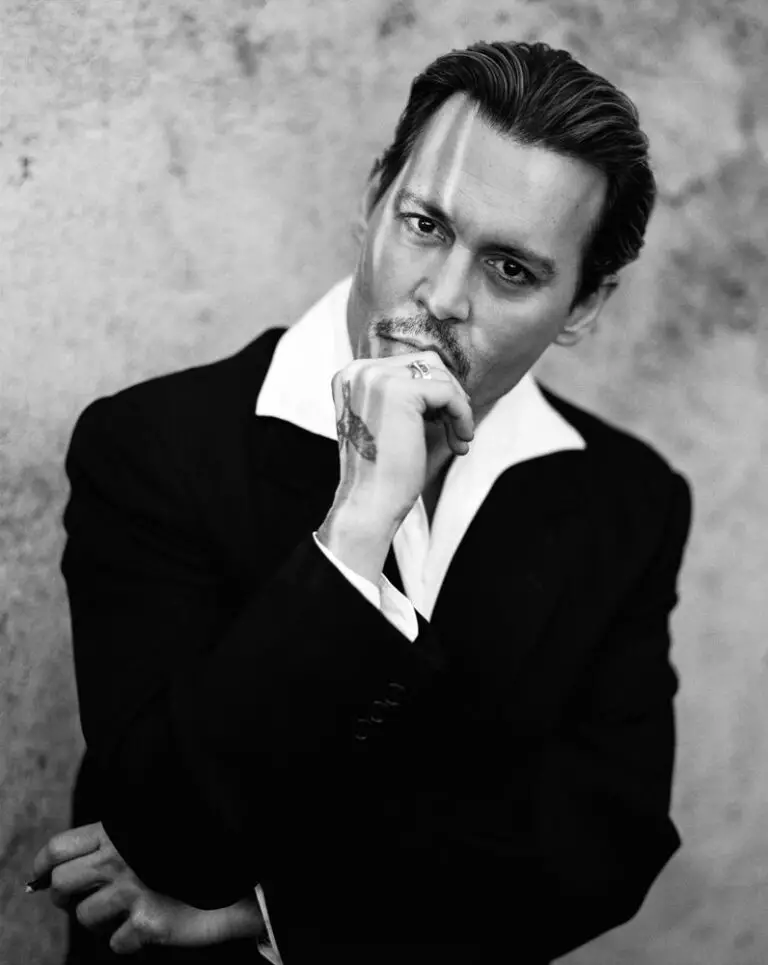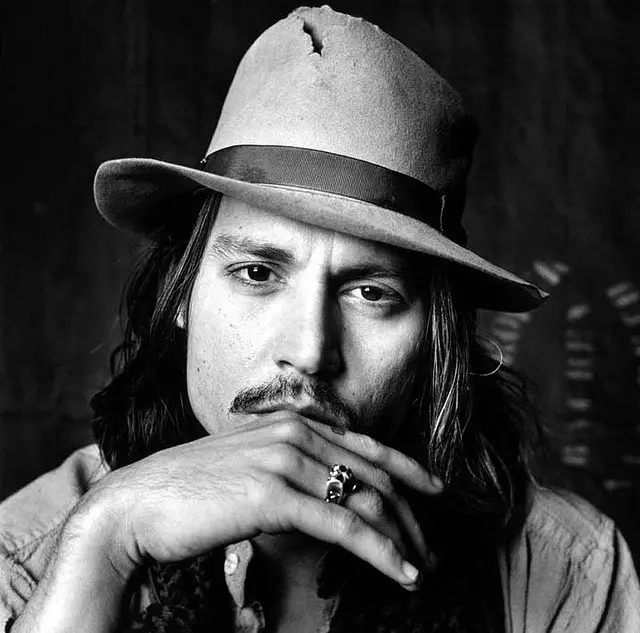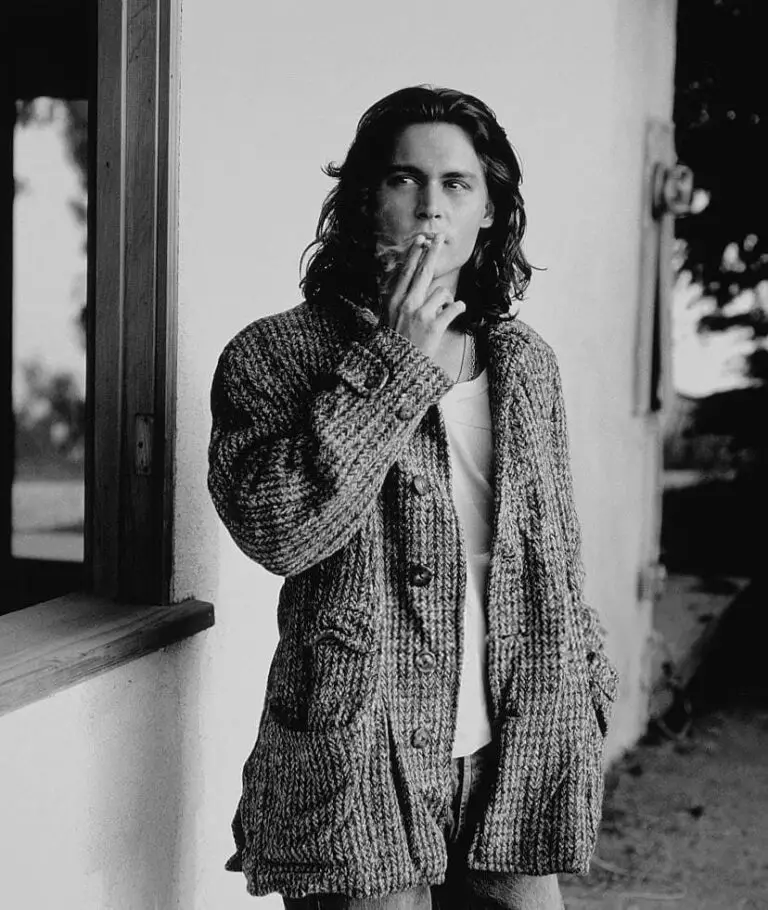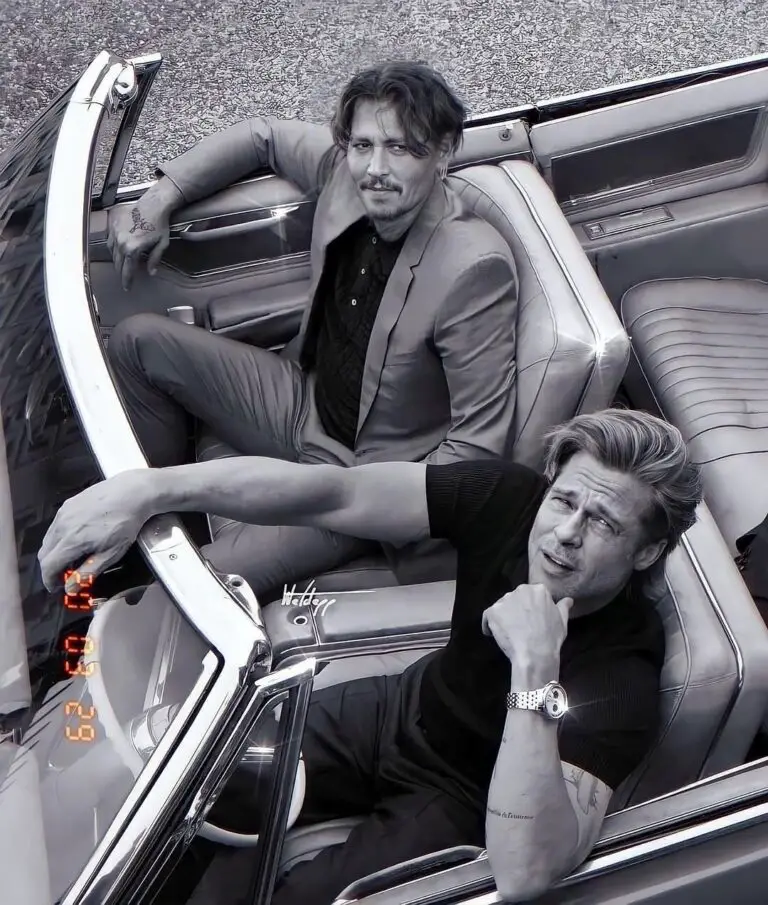Dive headfirst into the whirlwind era of the ’80s, where Johnny Depp wasn’t just a name, but a burgeoning symbol of a generation teetering on the edge of profound cultural shifts. Before the world knew him as Captain Jack Sparrow, Depp was carving his niche, a fresh-faced icon in the making, navigating the pulsating heart of a decade known for its excess and innovation. This journey into Johnny Depp in the ’80s is not just a trip down memory lane; it’s an exploration of the raw, untamed talent of a young actor whose every move off-screen and on was setting the stage for a legendary career.

Johnny Depp in the 80s
What made Depp stand out in an era adorned with stars? It wasn’t just his chiseled features or the mysterious allure he carried like a shadow. It was his choice of roles—diverse, challenging, and often ahead of their time—that whispered of the depth and breadth of his burgeoning talent.
Let’s peel back the layers of Johnny Depp’s early career, exploring how his ’80s persona—brimming with potential and charisma—was a precursor to the eclectic, often controversial, but always captivating figure he is today.
Early Life and Career

In the 80s, you would have seen Johnny Depp transition from a hopeful musician to a budding Hollywood star. His journey through this vibrant decade is marked by a significant shift in the path of his career and the beginning of his enduring legacy in film.
Rise to Fame

Before Johnny Depp became a renowned actor, he wielded a guitar with dreams of rock stardom. You could find him playing in various rock bands, his dedication even leading him to drop out of high school. The band the Kids, which he was a part of, moved from Florida to Los Angeles, where Depp struggled as a musician before turning to acting. His marriage in 1983 to Lori Anne Allison opened doors, as she worked as a makeup artist and introduced him to actor Nicolas Cage, setting the stage for Depp’s initial steps into acting.
Notable 80s Works

Johnny Depp’s foray into acting was met with swift success. A Nightmare on Elm Street (1984) was Depp’s feature film debut, where he delivered a memorable performance that still resonates with horror fans. This role was followed by the film Platoon (1986), demonstrating his versatility as an actor. However, his true catapult into fame was the television series 21 Jump Street (1987-1990), where he became recognized as a teen idol. During this time, his roles showcased a range of characters, setting the foundation for a diverse career ahead.
Influence and Contributions
In the 1980s, Johnny Depp began his journey in film, weaving a path that would leave indelible marks on the cinematic landscape and popular culture.
Impact on Film
- “A Nightmare on Elm Street” (1984): Your introduction to Depp in film likely started with his debut in this horror classic, where he played the role of Glen Lantz. His participation in this genre-defining slasher flick showed an early willingness to take on unconventional roles.

- “Platoon” (1986): Your recognition of his serious acting chops could have been solidified with Depp’s role in Oliver Stone’s Vietnam War film, which highlighted his ability to hold his own amidst an ensemble cast.

“21 Jump Street” (TV series, 1987-1990): Depp got his big break on television, leading to global recognition.

Depp’s early work signaled the emergence of a significant new talent in Hollywood during the decade.
Cultural Significance
During the 80s, Depp was not just an actor; he became a symbol of youth culture. With his:
- Diverse choice of roles: Depp’s choices mirrored your own desires for authenticity and depth in film characters.
- Stylistic influence: His appearances made waves in fashion, influencing your wardrobe with a cool, nonchalant style that defied conformist trends of the time.
Depp’s early career moves in the 80s set the stage for his enduring impact on film and culture.
Collaborations and Relationships
In the 1980s, Johnny Depp was carving out his path in Hollywood, both professionally and personally. You’ll see standout collaborations that helped define his early career alongside the key personal connections that made headlines.

- Collaborations:
- Johnny Depp’s career in the 1980s marked his transition from a relatively unknown actor to a rising star, thanks in part to his collaborations with various actors, directors, and musicians during the decade. However, it’s important to note that Depp’s most notable collaborations and breakthrough roles primarily came towards the end of the ’80s and into the early ’90s. Here are a few key points about his career and collaborations in the 1980s:
- “A Nightmare on Elm Street” (1984):
- “Platoon” (1986):
- “21 Jump Street” (1987-1990):
- Music Collaborations: Before his acting career took off, Depp was also a musician and continued to play with various bands throughout the ’80s. While these collaborations were more in the realm of music than acting, they were an essential part of Depp’s artistic journey during the decade.

- The late ’80s and early ’90s marked a turning point in Depp’s career, leading to more significant collaborations with directors like Tim Burton, with whom he would form a long-lasting creative partnership starting with “Edward Scissorhands” in 1990. The ’80s provided the groundwork for Depp’s career, setting the stage for his rise to stardom in the decades that followed.
Through these roles, Johnny Depp’s partnership with the industry grew, as he worked with renowned directors and actors that would set the stage for his illustrious career.
Personal Connections
In terms of relationships, Depp had notable romances during the ’80s that attracted public interest:
- Sherilyn Fenn: The pair met on the set of “Dummies” (1985) and were in a relationship for three years, contributing to Depp’s growing fame.

- Jennifer Grey: Depp was briefly engaged to the “Dirty Dancing” star in 1989; this relationship added to his high-profile persona.

- Winona Ryder: Johnny Depp and Winona Ryder were one of the most talked-about couples of the early 1990s, emblematic of young Hollywood romance at the time. Their relationship began in 1989, when they met at the premiere of “Great Balls of Fire!” in New York City.

During your exploration of Depp’s early days, it’s clear that his rising stardom was intertwined with both his early screen performances and his personal life, culminating in a decade of laying the groundwork for the formidable career and public fascination that followed.
What culture is Johnny Depp?
Early life. Depp was born at Lady of Mercy Hospital in Owensboro, Kentucky,He is the youngest child of an engineer and a waiter. He is of Belgian (Flemish), Dutch, English, French, and German descent. He’s also known to have Native American background as his grandmother was Native American.
What made Johnny Depp popular?
He initially came to film prominence as the titular character of Edward Scissorhands, and later found box office success in roles such as Ichabod Crane in Sleepy Hollow, Jack Sparrow in the Pirates of the Caribbean film series and Willy Wonka in Charlie and the Chocolate Factory.
What are some fun facts about Johnny Depp?
Johnny Depp
Donated $2 million to the Great Ormond Street Hospital in London.
Why is Johnny Depp so loved?
He is so kind, gentle, humble, generous he gives so much of his time and money to the kids who are sick, his inner dad comes out. He has support many charities. He has the ability to make anyone laugh and have a good time. He is able to make everyone feel safe and welcomed around him.
What’s Johnny Depp’s accent?
When the actor speaks out of character, for example, in interviews, his default accent is British, which is Johnny Depp’s accent in Pirates of the Caribbean. Still, he is known to mix a few other accents, like Australian and Irish.
If you liked our post about “Johnny Depp in the 80s”, then don’t forget to leave us a comment down below and tell us your favourite movie of Johnny Depp!

